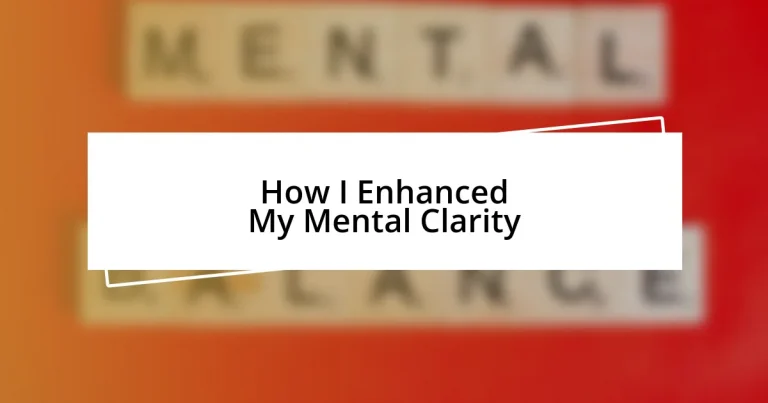Key takeaways:
- Mental clarity is achieved through recognizing and addressing personal barriers, such as environmental clutter, emotional baggage, and lack of focus.
- Establishing consistent daily routines and incorporating mindfulness practices can significantly enhance mental clarity and overall well-being.
- Tracking progress and making intentional adjustments based on journal reflections helps identify strategies that effectively improve mental clarity over time.
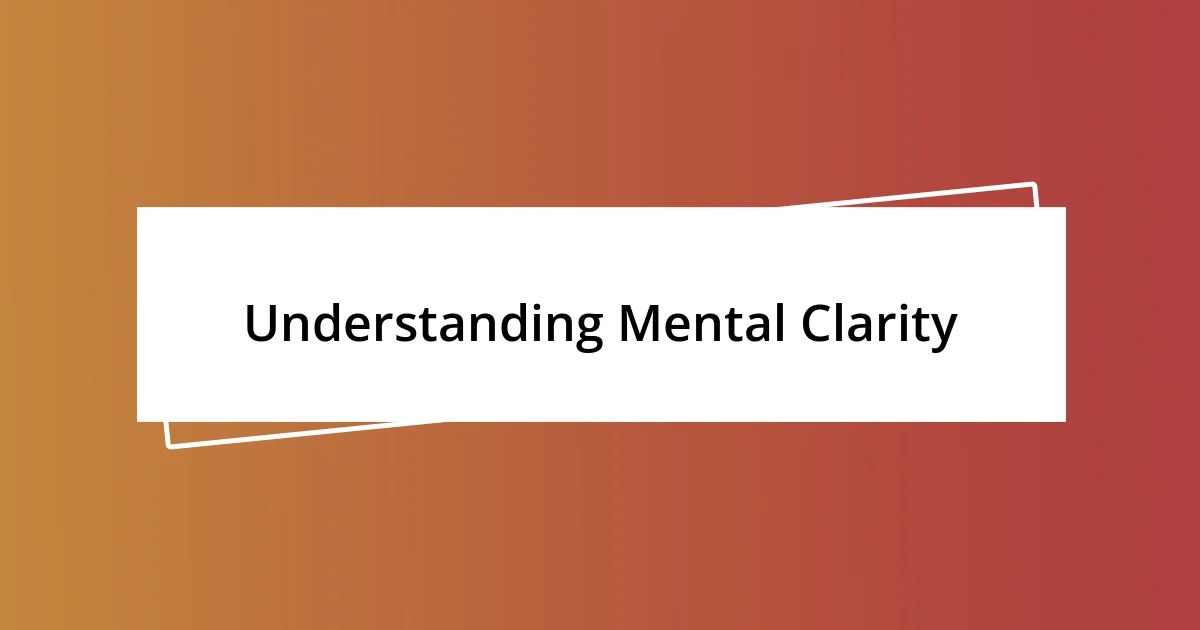
Understanding Mental Clarity
Mental clarity is often described as a state of mind where thoughts are clear, focused, and organized. I remember a time when my mind felt like a cluttered attic, filled with disarray and confusion, making even simple decisions overwhelming. Have you ever tried to navigate through a foggy day? That’s what a lack of mental clarity feels like, and it can be incredibly frustrating.
When I finally recognized the importance of mental clarity, it struck me that it’s more than just having a good focus; it’s about understanding what truly matters to me. A few years ago, during a particularly stressful period, I picked up journaling. This practice helped me untangle my thoughts and prioritize my emotional well-being, allowing me to see patterns I hadn’t noticed before. I wonder, have you ever taken a moment to reflect on what affects your clarity?
Ultimately, mental clarity is not just an abstract concept, but a crucial element of our daily lives. It encompasses the ability to process information efficiently and make sound decisions, enabling us to engage fully with our experiences. I find it fascinating how a clear mind can open doors to creativity and problem-solving, something I’ve personally experienced during brainstorming sessions that were once clouded by distractions. Isn’t it empowering to imagine what we could accomplish with a little more clarity?

Identifying Clarity Obstacles
Identifying what hampers my mental clarity has been an eye-opening journey. I used to think that distractions were just a part of life, but I realized they could be significant obstacles to my clarity. One day, while sitting at my cluttered desk, I noticed how my environment reflected my mental state. It was then that I understood the importance of an organized, serene space for fostering clear thoughts.
To pinpoint clarity obstacles, I found it helpful to reflect on various aspects of my life. Here are some common barriers I’ve encountered:
- Environmental Clutter: A messy workspace can lead to a chaotic mind.
- Digital Overload: Too many notifications and tabs open can drown out meaningful thoughts.
- Emotional Baggage: Unresolved feelings can cloud decision-making and distract from clarity.
- Lack of Focus: Multitasking often leads to shallow thinking and scattered ideas.
- Inconsistent Routines: Disruptions in daily habits can create mental disarray.
By acknowledging these obstacles, I felt empowered to implement changes that dramatically improved my mental clarity. It’s remarkable how identifying these barriers allowed me to reclaim that foggy space in my mind.
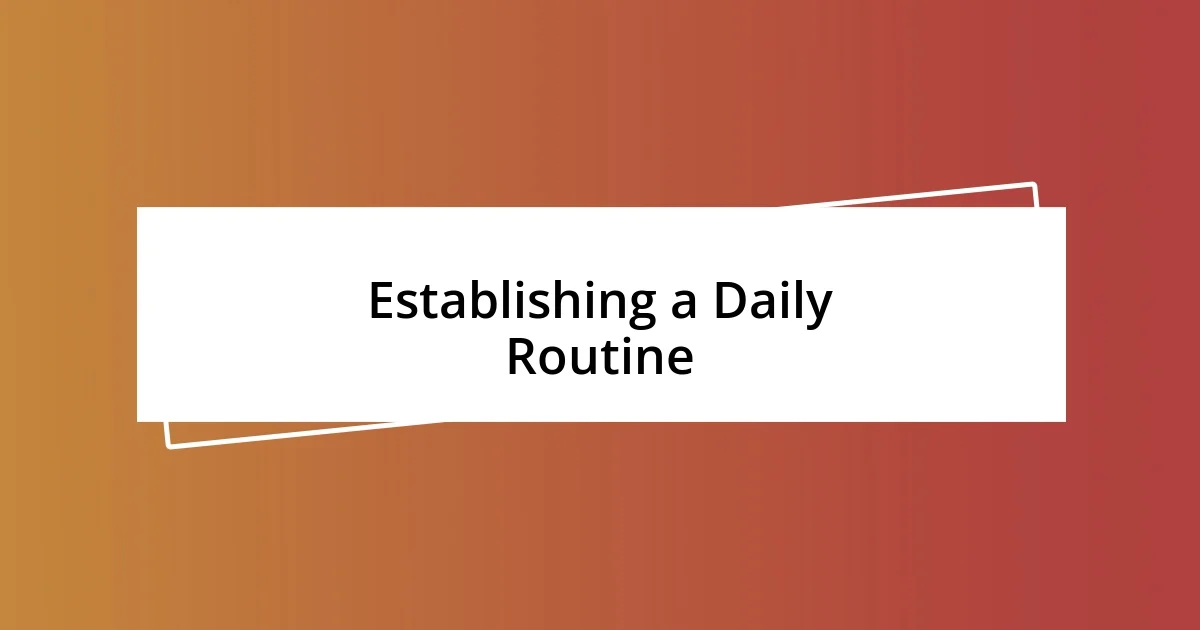
Establishing a Daily Routine
Establishing a daily routine has profoundly impacted my mental clarity. I’ve discovered that consistency is key; when I wake up at the same time every day, my mind feels more centered. I remember the initial struggle of this change—my body protested, and I often hit the snooze button. But committing to morning rituals has helped me ease into my day without the frantic rush, ultimately allowing my thoughts to flow more freely.
I’ve also learned the importance of incorporating intentional breaks into my routine. For instance, I allocate specific times for short walks or meditation, creating mental space between tasks. This practice has been a game changer for me. When my mind feels overworked, these breaks act like a reset button. Does that resonate with you? Think about how often you allow yourself those precious moments to recharge without guilt.
Moreover, keeping a simple evening routine has created a seamless transition into relaxation. After years of scrolling late into the night, I now spend my evenings journaling or reading. This shift has not only improved my sleep but also cleared the mental clutter built up throughout the day. Have you considered how your closing ritual affects your clarity? Making small adjustments can yield big results in how you approach the next day.
| Aspect | My Routine |
|---|---|
| Morning Wake-Up Time | Consistently at 6:30 AM |
| Midday Breaks | 15-minute walk or meditation |
| Evening Wind Down | Journaling or reading before bed |
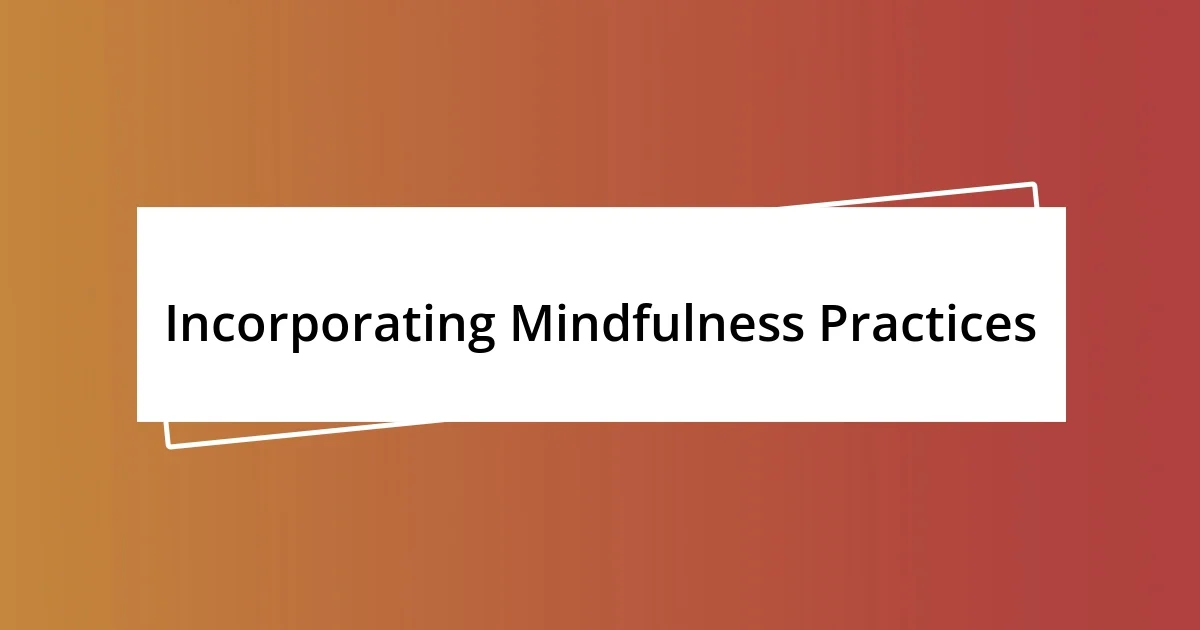
Incorporating Mindfulness Practices
Incorporating mindfulness practices into my daily life has been transformative in sharpening my mental clarity. I vividly recall the first time I sat in a quiet room, focusing solely on my breath. In those moments, I felt an unexpected calm wash over me, as if my thoughts were gently settling like fallen leaves. Isn’t it fascinating how something so simple can have such profound effects?
As I continued to practice mindfulness, I integrated short meditation sessions into my routine, even if only for five minutes. On particularly hectic days, I found that closing my eyes and simply listening to the sounds around me allowed me to reconnect with the present moment. The pressures and mental chatter would diminish, leaving me with a clearer perspective. Have you ever paused to notice how quickly life rushes by? Taking that moment to breathe transforms the chaos into clarity.
Mindful observation became another delightful practice for me. During walks, I challenged myself to notice each detail — the rustling leaves, the play of shadows, the laughter of children. I realized that being present in these small, beautiful moments not only calmed my mind but also sparked a sense of gratitude. This simple act of awareness helped me to shift my focus away from stressors. How often do we forget to appreciate the beauty around us? Embracing mindfulness awakened a richer appreciation for life, clearing my mental fog one mindful moment at a time.
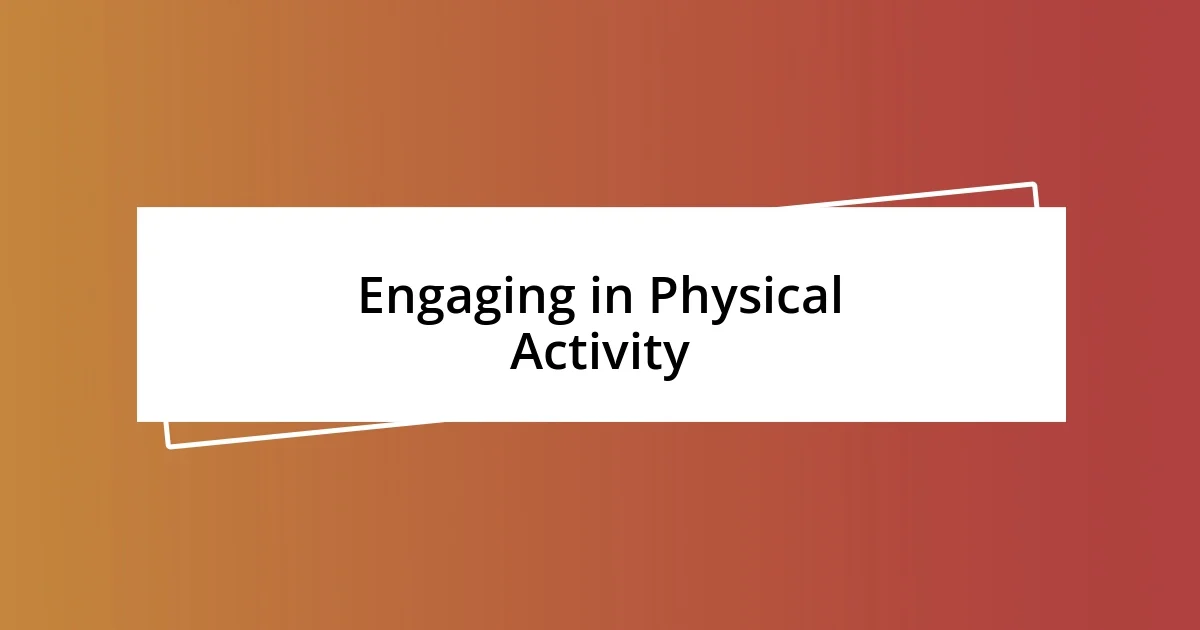
Engaging in Physical Activity
Engaging in physical activity has been a crucial part of enhancing my mental clarity. I remember the days when I’d skip the gym or my afternoon jog, thinking a few more minutes of work would be more productive. But I quickly realized that these exercises weren’t just about fitness; they cleared my head and sparked creativity. Have you ever stepped outside for a brisk walk and felt your thoughts begin to flow more freely? There’s something about the rhythm of movement that gets the mind in sync.
I often turn to running as my escape. When I’m on the pavement, the repetitive thud of my feet creates a meditative state; it’s just me and my thoughts. I’ve even discovered that challenging myself to run longer distances helps me push through moments of self-doubt. Those instances where I felt like giving up but chose to keep going taught me that persistence in physical activity mirrors persistence in life. How do you handle moments of struggle? I find that the strength I build physically translates to mental resilience.
Yoga has also played a significant role in my routine. The balance and focus required in each pose ground me in the present moment. I often reflect on how centered I feel after a session—a stark contrast to my earlier moments of chaos. During those sun salutations, it’s not just about flexibility; it’s a journey inward. Have you tried incorporating stretching or yoga into your day? For me, it’s a gentle reminder that clarity begins with self-connection, clearing away tension in both body and mind.
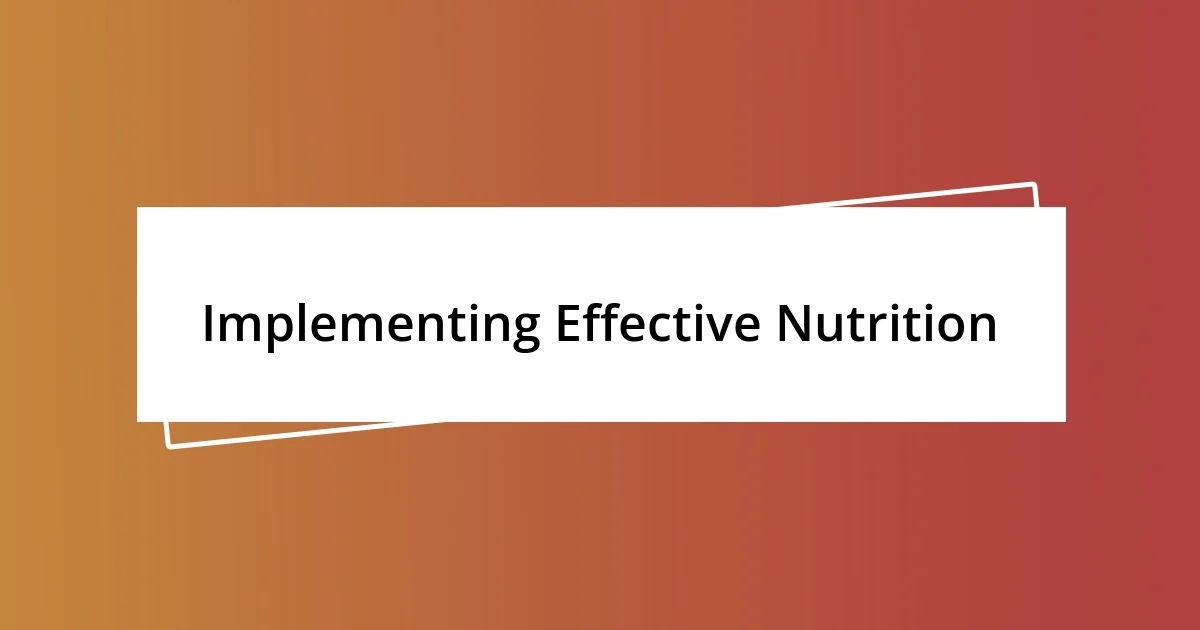
Implementing Effective Nutrition
Effective nutrition has been a game-changer for enhancing my mental clarity. I remember sitting down for breakfast one morning, realizing I was fueling my day with just coffee and a pastry. After a week of feeling foggy, I decided to prioritize whole foods like oats, fruits, and nuts. The difference was staggering! Have you ever noticed how much your mood can shift with a balanced meal? I found that nourishing my body with nutrient-dense foods left me refreshed and more focused.
One of my favorite rituals is preparing a vibrant salad packed with greens, colorful veggies, and a sprinkle of nuts. I can’t help but feel a sense of accomplishment when I toss together these ingredients. Each bite is a reminder that food can be both delicious and healthful. Have you tried incorporating more plant-based meals into your diet? I’ve seen firsthand how plant power fuels my creativity throughout the day, helping to maintain a clearer mindset.
Hydration, too, is essential. I once underestimated the role of water and often found myself weary by mid-afternoon. Now, I keep a large water bottle nearby, and I sip on herbal teas throughout the day. It’s fascinating to see how something as simple as staying hydrated can lift the mental haze. I also love adding a slice of lemon to my water—such a refreshing twist! How often do we overlook such a simple act? I can say that an adequately hydrated brain is a focused brain, making all the difference in my clarity and productivity.

Tracking Progress and Adjustments
Reflecting on my journey to enhance mental clarity, I found that tracking my progress was instrumental. I started keeping a journal where I noted my daily mood, focus levels, and the activities I engaged in. This practice revealed patterns—certain days felt consistently clearer, and I quickly identified which factors contributed. Have you ever stopped to track your own emotional shifts? It’s eye-opening to see how small adjustments can lead to significant changes.
There were times when I felt stagnant despite my efforts, and that’s when making adjustments became crucial. I recall one week when my energy dipped, and my usual strategies just weren’t cutting it. After reviewing my journal, I realized I’d been slacking on my morning walks. So, I set a specific goal to regain that routine, and I soon felt like my old self again. It’s a reminder that sometimes, even our best intentions need a little recalibration.
Moreover, I began experimenting with different techniques—adding mindfulness practices or tweaking my sleep schedule—and I meticulously tracked how those changes influenced my clarity. I remember going through a phase of restless nights, so I decided to prioritize a consistent bedtime ritual. Watching how my clarity improved with better sleep reinforced the importance of being adaptable. Isn’t it fascinating how our minds and bodies respond to even the smallest changes? Through tracking, I’m now more equipped to make these adjustments proactively rather than reactively.












